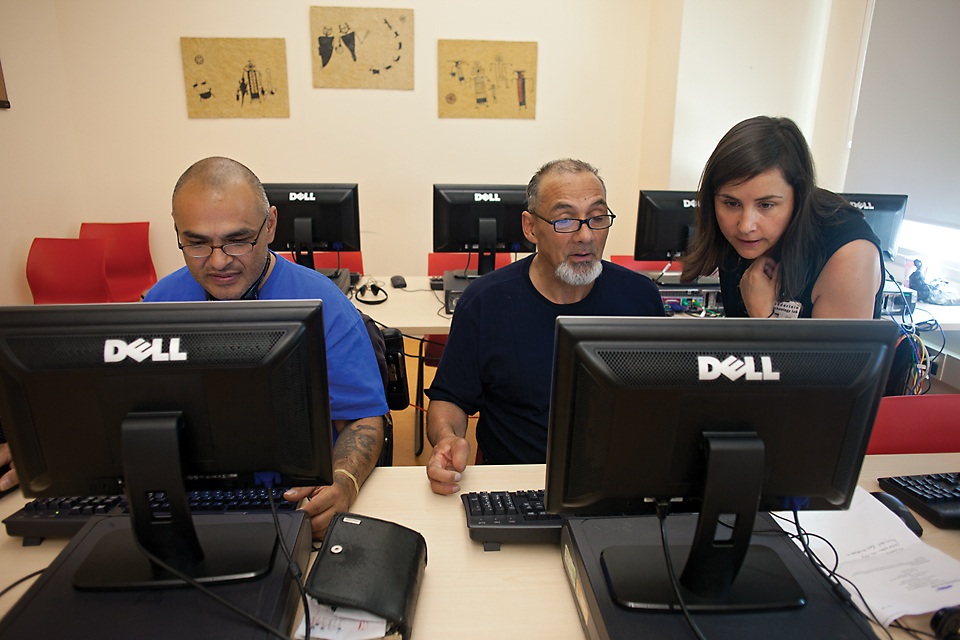Advocates argue for ‘open Internet,’ some fear minority redlining
The ongoing, often arcane, battle over whether telecommunications companies may slow certain online services and charge fees to speed up others has morphed into a civil rights controversy.
Many of the country’s leading civil rights organizations are siding with the phone and cable companies in their bid to prevent federal regulations over their broadband, or high-speed, Internet services. At stake: whether to preserve “network neutrality” — the longstanding principle that all consumers can access whatever websites or applications they want on the Internet, at the same speed and without limitations imposed by Internet service providers.
Clouding the issue, however, is that more than half a dozen of these groups are fighting accusations of being bought off by the telecom industry. Records of telecom contributions to minority interests reveal a minimum of nearly $2 billion in cash and in-kind support has been made in the past decade by the top three providers — AT&T, Verizon and Comcast.
The controversy is pitting traditional allies in the fight for social equality against one another as they clash over conflicting interpretations of what equal access on the Internet means for their constituents.
MINORITY GROUPS DIVIDED
For years, officials at the Federal Communications Commission in Washington, D.C., have been debating claims by industry proponents that regulation stifles tech innovation and free-market business activity. To that argument, telecom folks have added that the hit to their bottom line will inhibit their efforts to build out broadband infrastructure in digitally marginalized communities, especially those with heavily African-American, Hispanic and Asian populations.
Advocates of net neutrality counter that without sufficient government oversight to keep the playing field level, service providers such as Comcast, Verizon and AT&T will monopolize the Internet, reducing competition and creating a landscape in which only those with money can ensure that their online applications and Web content can be accessed by the public at top speed. The providers could not only slow the delivery of websites that don’t pay up but also impede those whose content they don’t like, neutrality advocates say.
The prospect of telecom censorship was highlighted in a 2008 case, in which the FCC found that Comcast had secretly blocked its customers from using BitTorrent, a free file-sharing application. Such predatory business practices, say critics, would mean that millions of people would have much of the Internet unavailable to them, including low-income and working-class communities, small business owners, artists and political dissidents.
Of special concern to activists is the impact unregulated telecom control could have on minority communities, where broadband Internet usage has grown but continues to lag that among whites. Imposing premium access fees would undermine efforts to close the digital divide, according to Amalia Deloney, grassroots policy director for the Oakland-based Center for Media Justice.
“We all fear that these corporations — AT&T, Comcast, Verizon — really want to control the Internet for their own benefit,” Deloney said. “What it would cost for people to be able to get the Internet they want is a huge issue.”
Deloney’s group banded with 45 national and local organizations to form Latinos for Internet Freedom. The Center for Media Justice also is part of the national Media and Democracy Coalition. These groups are promoting public debate on net neutrality and the future of the Internet.
However, several minority organizations are not interested in the pro-net neutrality argument and question the FCC’s attempts to oversee the telecoms.
“There’s been no analysis of net neutrality rules and what that will do to the digital divide,” said Gus West, chairman of the Washington-based Hispanic Institute and co-chair of the Hispanic Technology and Telecommunications Partnership.
By prohibiting the telecoms from charging more for priority access to content, West said, the FCC could significantly reduce the revenues available for these companies to invest in extending their pipelines into underserved communities. The Internet service providers might even end up charging higher rates to low-income consumers to cover their costs in these areas, he said. Among those who share West’s concerns are civil rights leaders from the largest, most established organizations — though they hesitate to take an official stance. These include the National Association for the Advancement of Colored People, the League of United Latin American Citizens, the Organization of Chinese Americans, the Asian American Justice Center, the Asian Pacific American Legal Center and the Japanese American Citizens League.
The chief concern among these groups is that a lot of money is needed to spread broadband infrastructure to every corner of the country and close the digital divide. And they say they are not convinced that those funds will come through public mandate.
George Wu, executive director of the Organization of Chinese Americans, said broadband expansion among minorities won’t happen through basic policymaking or consumer action.
“We understand up front that broadband adoption, broadband accessibility has a lot to do with the bottom lines of the companies building the infrastructure,” Wu said.
However, while West’s organization rejects net neutrality outright, the Organization of Chinese Americans has not committed to a public position.
The same goes for the Asian American Justice Center.
“The organization is still evaluating the situation, but they have not formalized an opinion on it as of yet,” said Vincent Eng, the group’s former deputy director, who still assists on broadband policy matters.
Leaders from other groups echoed similar equivocations, saying they have taken no stance on net neutrality because they do not have a firm grasp on the issue.
“Generally, there’s not a lot of understanding and people are still trying to develop their position on the issue,” said S. Floyd Mori, the Japanese American Citizens League’s executive director.
“We’re trying to get information, or trying to listen to the various viewpoints,” said Stewart Kwoh, executive director of the Asian Pacific American Legal Center. “But it’s kind of confusing.”
CONFLICTS OF INTEREST?
The complexity of a debate mired in technical jargon may account for some uncertainty, but the telecoms nonetheless have managed to influence the civil rights groups because of millions of dollars in contributions over the years, say critics.
Joseph Torres is senior advisor at Free Press, a Washington, D.C.-based nonprofit group that supports net neutrality. His organization met with civil rights groups last December to discuss their positions.
“One of the national groups said they personally support net neutrality, but they can’t take a position because of the relationship with telecoms,” Torres said.
Since that meeting, several other groups have privately made similar statements, he said. Torres declined to identify the groups he met with.
A June letter to the FCC from Comcast stated that the company and its foundation contributed $1.8 billion in cash and in-kind support to minority community groups over the past nine years. Among the recipients were four of the previously mentioned civil rights groups: NAACP, Organization of Chinese Americans, League of United Latin American Citizens and Asian American Justice Center. Other recipients were the National Urban League, National Council of La Raza and the U.S. Hispanic Chamber of Commerce.
Similarly, AT&T noted on its website contributions of $2.8 million over the past 10 years to African-American organizations, including the NAACP and the Urban League. This figure represents just a fraction of the telecom giant’s giving to minority communities.
A partial online list of Verizon’s outreach includes $450,000 to the Latino organization ASPIRA this year; $500,000 to the NAACP in 2009; and a total of $3.2 million in 2008 to the National Council of La Raza, Urban League and League of United Latin-American Citizens.
Telecom employees also have contributed time as volunteers and advisers to these groups.
“AT&T, Comcast, Verizon have all served on our business advisory council for a number of years,” Wu said. But the group “would never put ourselves in a position” of taking a stand based on its corporate partners, he said
League of United Latin-American Citizens and the NAACP did not respond to requests for comment. But they have consistently questioned net neutrality, as evidenced by public comments sent to the FCC and letters asking congressional representatives to intervene.
ColorOfChange.org, a political advocacy group based in Oakland, is calling attention to these financial relationships. While there is no hard evidence of any quid pro quo, these connections should inform the public debate, said William Winters, an organizer with the group.
“Obviously, money buys a certain amount of access, which affords a certain amount of influence,” Winters said. “If you have an organization like AT&T and Comcast helping to fund major initiatives for your group, then there’s a good chance that you’ll listen to what they have to say when they ask you to sit down to have a conversation about digital inclusion and net neutrality.”
PERSISTENT BARRIERS FOR MINORITIES
With top civil rights organizations backing the Internet service providers, net neutrality proponents face a stiff challenge. The kind of policy the telecoms and their allies want, Torres said, is going to create the same anti-competitive barriers online that affect traditional media and which media reform advocates have for years been trying to dismantle.
Complicating matters, the conflict over net neutrality has spread to the wireless Internet. In August, Google and Verizon jointly proposed to resolve the dispute by creating a paid-access level of service for mobile devices only, charging premium rates for more bandwidth-intensive content like high-quality video. While the companies agreed not to slow traffic on broadband Internet, no such restrictions would apply to mobile wireless.
Both Google — which had been regarded as an avid defender of net neutrality — and Verizon claim this compromise solution is meant to protect net neutrality while also allowing legitimate revenue streams. But Torres of Free Press said the new proposal escalates the battle. The agreement would also prevent the FCC from enforcing net neutrality, relying instead on enforcement by an industry-controlled committee.
The same rules that would apply to broadband should apply to wireless Internet, said the Center for Media Justice’s Deloney.
Creating a net neutrality exemption for mobile devices would clearly impact minority communities.
While a recent Pew Internet & American Life Project study said 56 percent of African-Americans use broadband, compared with 67 percent of whites, minority groups are actually ahead of the rest of the population in owning cell phones. Eighty-seven percent of African-Americans and Latinos own them, compared with 80 percent of whites, according to another Pew study on mobile access. It also said 64 percent of African-Americans and 63 percent of Latinos are wireless Internet users.
The same study found that nine in 10 Americans ages 18 to 29 owned cell phones, with 65 percent of them accessing the Internet through their devices.
Among ethnic minorities and youth, who often don’t have access to broadband Internet or can’t afford it, wireless has become the affordable platform of choice for getting online, Deloney said.
In San Francisco, Sekuh Paopao, a student at Thurgood Marshall Academic High School, said that because of the lack broadband at home, she and many of her friends have found another way to access the Internet: “I just get it through my phone.”
This story was produced under the Internet Reporting Fellowship, a program sponsored by the G.W. Williams Center for Independent Journalism in collaboration with New America Media, with additional research by Linda Jue. A version of this article was published in the fall 2010 edition of the San Francisco Public Press newspaper. Read select stories online, or buy a copy.










